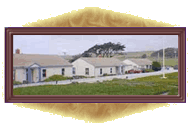 |
 |
 |
|
|||
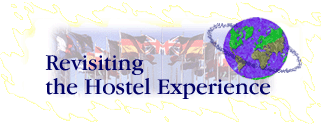
Revisiting the Hostel Experience When I was younger I traveled a lot hitchhiking and I stayed in youth hostels and thought it a luxury to be able to take a shower and sleep in a bed, even though the bed was in a room with a bunch of other people. I enjoyed meeting other travelers, people like Thomas Bickle Wilder from Toronto, who came up to me at the hostel in Whitehorse, Canada, and said, "I'm going to rent a canoe and float down the Yukon River; do you want to go?" He was 17; I was 19. I told him I'd never been in a canoe, and he laughed and said he could teach me everything I needed to know. We floated for a week, saw not one other human being, and I still think of that trip, 20 years ago, as one of the best things I've ever done. And I remember two German "world travelers" at a hostel in Colorado who ate nothing but boiled potatoes. They'd been to Nepal, southeast Asia, the Pacific islands, eating potatoes the whole way, saving their money so they wouldn't have to go back to Germany. They used a lot of hot sauce, and sweated profusely, and still this was better, much better, than going back to Germany. And then there was a young guy, a hitchhiker like me, in the hostel in Point Reyes, on the coast of California, the first one I ever stayed in, who told me he could hitchhike a thousand miles a day and I thought he was exaggerating until I started doing it myself, making the continent small. 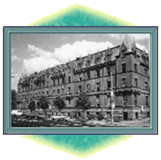
So when The Savvy Traveler asked me to do a story on hostels I said sure, I love hostels, even though I hadn't stayed in one in many years. I said I'd been wanting to go to New York; maybe there was a hostel in New York, and, sure enough, there was. It's on 103rd street, between Broadway and Central Park, in a five-story red brick building that used to be an old folks home. It sleeps 624, men and women separated in rooms with 4-12 beds. The check-in was like at a hotel, the staff in uniform, young and professional, security guards with radios, everything under control even though the place was close to full with student groups from Germany and Japan and Indiana. It had a coffee bar, a reading room, a patio with a water fountain, even a small chapel and an in-house travel agency. The elevator had stopped working, so I carried my bag up to a small room on the fifth floor -- one window, two bunk beds, three other guys. There was Roberto, from Argentina, who laid on the top bunk with his shirt off and smoked even though it was against the rules, and two guys who said they were from Pittsburgh, although one spoke with a French accent and looked like he was from somewhere on the Arabian peninsula. These two laughed a lot, but their jokes were private, and when I said I'd like to ask them some questions on tape the one with the accent said "No, no way, we live too much on the fringe to be talking on the radio." He'd left home in Algeria five years ago to avoid going into the military and being killed. He said he'd been all over the world and I believed him. I asked him how he made money and he said he survived doing "anything it takes -- conning, stealing, lying, hustling." He was young and smart, trying to shock me. His one great line was, "There is no challenge, there never was, and never will be a challenge." Meaning that he's like water, and if someone or something gets in his way, he just flows around it, no problem. He was suspicious and careful and wouldn't tell me his name. He said he and his friend had come to New York to join the Million Man Marijuana March that was going to happen the next day, May Day, in and around Washington Square. "You should come down; there'll be thousands of people all smoking reefer -- the cops don't do nothing." 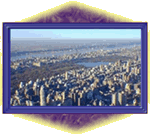
I did not sleep well. The air was stuffy and the mattresses were covered with a hard plastic so brittle and noisy that you woke up if you rolled over, you woke up if anyone in the room rolled over. And then Roberto, from Argentina, snored, really loud; the kind where you're not sure if the guy is going to gag or just stop breathing all together, and at a certain point I sat up and whipped my blanket an inch or so above his face, and he sat up suddenly and looked at me like "What'd do that for?" and I looked at him like "What do you expect?" although neither of us actually said anything, and he was quiet after that, maybe because he was afraid to go back to sleep. In the morning, in a hostel, you're supposed to get up and get out and go do something -- have some experience that you'll remember, which is what traveling is all about. Some hostels even make you leave during the day. The one in New York doesn't, but I was out of there, showered and shaved by six a.m. I headed south along Central Park past the Museum of Natural History, with the bronze statue of Theodore Roosevelt mounted on a horse, an Indian guide standing by his side holding a spear that looks -- from a sideways perspective -- like it's going straight up the great statesman's butt. It was a pretty day, May Day, a Sunday. Coming in on the plane the trees in the forests of New Jersey and Delaware were bare, like it was still winter, but the trees in the park had leaves and flowers and it was spring. People running, bicycling, rollerblading and one woman riding a horse, galloping, dressed for a fox hunt -- big boots and a little whip in one hand. Amazing. New York City is amazing. I walked all the way to the Bowery and called my friend Benoit the photographer and we had coffee and made big plans for the future, and then in the afternoon I went to Washington Square, as the errant Algerian had recommended, to see the Million Man Marijuana March. The park was full of people. Thousands. The white people seemed to be mainly on the east side, some with picnic blankets spread out on the grass, and the west side was shoulder to shoulder and mostly black people, mostly men, many of whom were smoking big splifs of marijuana. The police were on the perimeter in groups of six or seven, relaxed and laughing, almost like they had been smoking too. Amazing. I sat down next to a Rasta man who rolled me a joint, and I was watching this Rottweiler that was sitting about ten feet away from me. It was kind of a wild scene in some ways -- five boom boxes in every direction, live drumming, some shouting and rapping -- but the dog was cool, seeing everything but not getting involved. And I thought, "That's right, that's the way to be in New York; people come here from all over the world, speaking all kinds of languages, and they're all cool, no problem, no challenges." 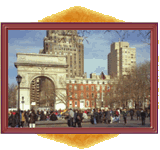
But then people started jumping up to see what was happening over by the fountain, which was pretty much right in front of me but blocked from view. I saw a woman turn and say, "Fight" and then I heard the crowd moan in unison. I walked around to where I could see and there were two tall black guys with their shirts off flailing away, charging each other and throwing blows and retreating, covering a lot of ground, parting the crowd and carrying others on ahead like the running of the bulls in Spain. And in the distance, on the east end of the park, I could see people running away in solid streams, the floodgates pulled open. Every sidewalk, every available inch of space was filled by legs moving in an all or nothing sprint, like a bomb exploded or somebody had a gun. But I was right there and able to see just about everything and there was no bomb or gun, just these two guys fighting. That entire half of the park cleared out entirely in less than 20 seconds, and, this is another amazing thing about New York -- when New Yorkers run for their lives, not one of them falls down. The Rottweiler was in the same place, sitting like before, still cool. I walked over and read him the line by George Washington on the big granite arch above the park: "Let us raise a standard to which the wise and the honest can repair." And the dog looked up at me and said, "Be excellent to one another." For comparison with the New York hostel, which is the biggest hostel in the country in the biggest city in the country, I went to a little hostel at a lighthouse on the coast of California. All hostels are the same in that they're all a part of the same non-profit corporation that establishes some basic rules and general philosophy, but all hostels are different in that they're all in buildings that used to be something else--like a church or an army barracks or a hotel or a lighthouse. The corporation buys the building and hires the staff. Some hostels make money, some lose money. In 1970 there were many hostels in the U.S., and now there are more, so they are growing. The lighthouse at Pigeon Point is fairly new. Hosteling International bought it from the coast guard several years ago. It has five small houses in a row at the base of a 150 foot light tower. Kristen Lindstrom was working at the desk in the main house..
Kristen was like a breath of fresh air and the perfect hosteling ambassador -- young and adventuresome, hungry for stories and wanting to laugh.
I tried to do my best and promote peace and understanding with my fellow hostelers in the Dolphin House that evening, but it wasn't a happy group -- a couple of middle-aged American women and four Germans, strange young men who spoke excellent English but had almost nothing to say. The house was a modular unit of the highest quality government issue -- three bedrooms, two bathrooms, a kitchen and a living room. The Germans sat at the kitchen table and played poker, quietly, while the couple of women read books in the living room and then went to bed early. Outside, it was dark and raining, cold and windy, the waves crashing on the rocky shore, the light at the top of the tower circling every nine seconds. From far out in the ocean looking back the light would be blinking, hello, but I was sure there was no one out there to see it except maybe whales and dolphins. Hello from America. Hello from California. Again I had trouble sleeping. It was easier when I was younger to sleep in a room with other men. Now if I'm sleeping in a room with other men I feel like I must have done something wrong, made some kind of mistake, and I spent much of the night wondering what it was, and where it was, and whether I was to blame, and then, thank God, it was morning and I went and found Kristen and asked her advice.
I'd never been surfing. It was still raining, windy and cold, but I'd always wanted to go surfing. I drove 22 miles south to Santa Cruz and rented a board and a suit in a shop on the beach, 20 bucks. The guy there telling me how to get started. He said go out where the other guys are and plead ignorance, look for old guys with long boards, watch where they position themselves between the sets. When the wave comes just paddle like hell and don't try to stand up on the first one, just ride it out and get the feel of the board on the water. The second one you can try to stand up. So I went out and the waves were huge, twelve feet, monstrous, and I flailed and got thrashed for an hour or so until I did what the guy in the shop said and paddled over to where some older guys with long boards were waiting, sitting up looking out for a set of big waves. And when I got there it was all very obvious, you could see the big wave coming, and everybody was down on their boards turning around. I started paddling as fast as I could and looked back and the wave was right there. It picked me up and threw me, roaring and crashing, and I thought it was all over and I'd be smashed into a foamy pulp, but the board knew what it was doing and slid on top of the water, quiet and steady, and I just held on and rode out and away from the chaos lapping at my heels. What a gas. I stayed out until my hands and feet turned blue and then paddled over to some steps and stumbled up shaking and drooling to the parking lot and put my key in the door but couldn't manage to turn it, my hand no longer worked that way. So I stood there, teeth chattering, thinking, 'Now, this is a sport, perhaps the best sport ever." I rubbed my hands and remembered Kristen laughing, "You should do it all." And I wanted to drive back to the hostel and thank her and tell her I felt like I had done everything and that the day had been a good one. For The Savvy Traveler, this is Scott Carrier.
|
 | American Public Media Home | Search | How to Listen ©2004 American Public Media | Terms of Use | Privacy Policy |
 Lindstrom: "We're on the edge of the world, the corner of the continent.
Rugged, but not too rugged, a lot of rocky areas as well as some sandy
beaches, we get a lot of coastal fog which makes it cold at times but still
beautiful. We are near the redwood forests, which is a special treat. If
you've never seen redwoods, they are huge trees that are just incredible,
some rolling hills and forests, but right here where we are it's very
coastal. Where my room is located right next to the light house and it's
on the absolute edge, I mean it's 20 to 25 feet to the edge, up high on the
point, on the rocks, and it feels like I am on the edge of the world, I
look out the window and I just see out there forever, I'm right there, I
wonder what's out there. I see ships go by every once in a while, otters,
dolphins, seals and whales, gray whales, humpback whales.
Lindstrom: "We're on the edge of the world, the corner of the continent.
Rugged, but not too rugged, a lot of rocky areas as well as some sandy
beaches, we get a lot of coastal fog which makes it cold at times but still
beautiful. We are near the redwood forests, which is a special treat. If
you've never seen redwoods, they are huge trees that are just incredible,
some rolling hills and forests, but right here where we are it's very
coastal. Where my room is located right next to the light house and it's
on the absolute edge, I mean it's 20 to 25 feet to the edge, up high on the
point, on the rocks, and it feels like I am on the edge of the world, I
look out the window and I just see out there forever, I'm right there, I
wonder what's out there. I see ships go by every once in a while, otters,
dolphins, seals and whales, gray whales, humpback whales.
